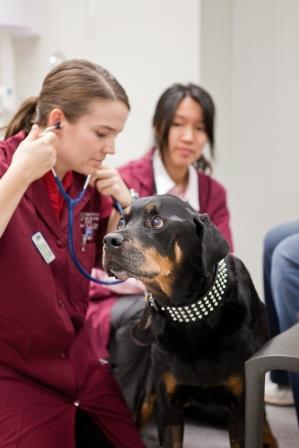UQ Vet focuses on one health—for all creatures great and small
As the gatekeepers of the interface between humans and animals, veterinarians have many roles.
While the local “pet vet,” who vaccinates and treats beloved “Fido” may be the most recognisable, veterinary practice in Australia and Canada encompasses much more diverse fields, including small and large animal practice, emergency medicine, animal production, public health and disease control, quarantine and biosecurity, research and education, pharmaceuticals and commercialisation, animal welfare and therapeutic treatments, and wildlife conservation.

Over the last decade, the veterinary profession has progressively shifted its focus to a more holistic and integrated approach, which links animal, human and ecosystem health to promote all components through interdisciplinary cooperation.
Concepts of One Health have gathered momentum from an initial focus on understanding and controlling significant recent emerging infectious diseases (EIDs) such as Ebola, avian influenza, and Hendra viruses.
Many recent EIDs originate in animal populations and pose threats to human and environmental health. Veterinarians are playing vital roles in collaborative teams to combat these diseases.
The scope of One Health activities is now extending to embrace broader issues that span animal, human and environmental health, such as sustainable food systems, climate change, biodiversity, animal welfare and many others. A truly integrated approach requires multidisciplinary expertise, including sociological, agricultural, ecological and non-technical knowledge and skills.
An example of such an approach being used to combat recent challenges is the work UQ School of Veterinary Science epidemiologist Dr Ricardo Soares Magalhaes has been conducting, which informs disease control policy by better understanding the link between geographical distribution of animal and human infections and their associated morbidity.
One of his recent projects has involved studying avian influenza—better known as bird flu—and rabies with the Food and Agriculture Organization of the United Nations, the China Animal Health Epidemiology Centre and the China Centres for Disease Control.
Dr Magalhaes is also currently using Big Data to map and develop rapid responses for the West African Ebola virus, with important applications to other emerging infections such as the South American Zika virus.
This research has already improved veterinary teaching methods.
Students in developing countries are now taught improved antimicrobial awareness and mitigation, and have increased awareness of usage of antimicrobial agents (such as antibiotics) and resistance in the pig industry and in avian species.
Studying veterinary science at the University of Queensland
Are you interested in veterinary science? Since its first intake of students in 1936, UQ’s School of Veterinary Science has been recognized for a sustained record of excellence in teaching and learning across the veterinary disciplines and the quality of its research.
The school is based at a purpose-built site with first-rate facilities for teaching and research and access to horses, cattle, pigs and poultry.
Program: Bachelor of Veterinary Science (Honours)
Location: Gatton, Queensland
Semester intake: February
Duration: 5 years
Application deadline: General application deadline of November 30; however, late applications may be accepted. It is strongly recommended that students apply a minimum of three months prior to the program’s start date.
The UQ School of Veterinary Science has full accreditation with the American Veterinary Medical Association (AVMA), and with both the Australasian Veterinary Boards Council and the Royal College of Veterinary Surgeons in the UK, enabling UQ graduates to also practice in North America, Australia, New Zealand, UK, Hong Kong and most of Asia.
Apply to UQ Veterinary School!
*


































Ask A Question
Ask us about your program of interest, or if you have a question about our services.
CONTACT US TODAY